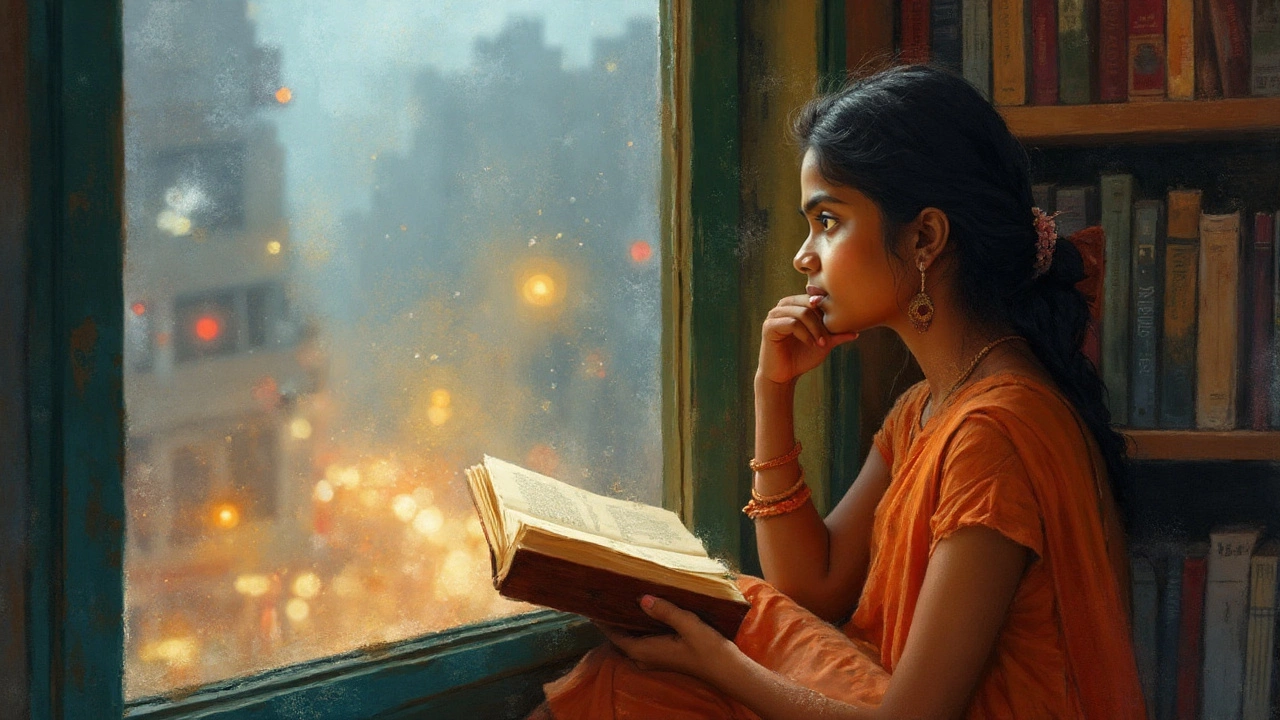Literary Fiction Explained: What Makes a Book Truly Literary?
 Aug, 3 2025
Aug, 3 2025
You probably know people who are quick to announce, "I only read literary fiction," as if it's some sort of exclusive club. But what does that phrase even mean? Spotting literary fiction on a store shelf is like trying to pick a rare truffle out of a pile of regular mushrooms—it looks similar on the outside, but it's hiding something special inside. The funny thing? Even writers and critics can't always agree where the line sits. But let's pull back the curtain and figure out why certain books land in this category while others don't.
The DNA of Literary Fiction: What Sets It Apart?
At first glance, literary fiction can look like any other novel. There are pages, characters, stories, and emotions. But start reading, and you’ll notice a different energy under the surface. Literary fiction digs deeper than just creating a wild plot or keeping you on the edge of your seat. Think about a book that made you pause, reflect, maybe even see the world—or yourself—a bit differently. That’s the heartbeat of literary fiction.
What sets these stories apart? The style and language matter just as much as the narrative. Authors spend as much time crafting individual sentences and images as they do piecing together the plot. It’s about the journey of reading, not just the destination. In fact, a study done at Yale in 2019 found that literary fiction readers had a higher recall of symbolic language and subtle emotional cues. That attention to detail can make these books more challenging, but also more rewarding for the right reader.
Character-driven stories are another hallmark. You won’t find secret societies or alien invasions front and center—unless they’re a vehicle for bigger conversations about the human experience. In literary fiction, the plot often serves the characters and their internal struggles, not the other way around. Think of books like "To Kill a Mockingbird" or "Beloved"—you remember the people and their transformations as much as or more than what actually happened.
Plus, literary fiction doesn’t always tie things up neatly. Endings can be ambiguous, messy, or even unsatisfying in a traditional sense. This isn’t laziness—it reflects real life, where answers aren’t always clear. That’s the difference from genre fiction, which tends to wrap up with more resolution. And readers who crave challenge often say that literary fiction offers a slow-burn satisfaction you can't get anywhere else.
Literary vs. Genre Fiction: Where’s the Line?
So is literary fiction just a snobby way of saying "serious books?" Not exactly. The old story is that if a book entertains, it’s genre fiction; if it enlightens, it’s literary. But look closer and it’s not that simple. The boundaries blur every day. Margaret Atwood’s "The Handmaid’s Tale" is speculative fiction, sure, but it’s also a mainstay on literary syllabi. Colson Whitehead’s "The Underground Railroad" plunges into magical realism and wins the Pulitzer. These books straddle the border, bending the rules.
Here’s the deal: genre fiction usually follows certain formulas, like mysteries, romances, thrillers, or fantasy epics. They’re often plot-driven, meant to entertain and provide a satisfying structure. Literary fiction isn’t allergic to plot, but it focuses more on how the story is told, the depth of the writing, and the themes it explores. The test: If a book’s memorable for its beautiful sentences or complex characters, it likely leans literary. If you can describe it in terms of a tight storyline or clear-cut outcome, it probably fits more comfortably in genre.
But there’s cross-pollination everywhere now. Front-table bookstores pile up literary thrillers, literary sci-fi, and even literary romance. Some agents say that “literary” is now mainly a marketing term. That’s why you’ll see books on prize lists that you’d also find with dragons or detectives. Readers are voting with their wallets and reading habits—according to a Pew Research Center report in 2023, over 40% of readers said they enjoy books that mix literary and genre elements. So while the categories exist, the best books play in the gaps between them.

What Makes Literary Fiction So Impactful?
Why do some stories stick with us for decades, even shaping the way we see other people? Literary fiction is designed to challenge readers. It throws you into different heads, perspectives, and emotional spaces, asking you to feel discomfort or uncertainty. In several studies I checked—like a 2020 paper from the University of Toronto—participants who read literary fiction scored higher on tests measuring emotional intelligence and empathy, probably because these books immerse you in minds and motives unlike your own.
What else? Literary fiction is a champion of the big questions. Authors aren’t afraid to get philosophical, political, or even existential. They’ll take on race, gender, memory, class, trauma, family, and identity—and refuse to give simple answers. You’re not just being entertained; you’re being asked to think, to argue, to reflect. That’s why these books often spark conversations, debates, or even movements. Remember the waves caused by books like "Never Let Me Go" or "The Road"? The real impact wasn’t just the story itself, but the uneasy discussions that followed.
Then there’s voice and style. Literary writers lean hard into language, shaping rhythm, metaphor, and symbolism. Sometimes you’ll need to slow down, reread a passage, fill in the blanks. The payoff? Moments of recognition, understanding, or beauty that feel unique. Here, it’s less about the surface events and more about the reading experience. Literary fiction may not offer the adrenaline rush of a thriller, but it rewards readers with emotional and intellectual depth that stays long after you turn the last page.
Navigating the Literary Fiction Landscape: Tips for Readers
So maybe you’re thinking about dipping your toes into these deeper waters—or you’ve tried before and got lost. Where do you start, and what’s the best way to enjoy literary fiction without feeling shut out? Here are a few tips to make the most of your reading journey:
- Start with authors known for balancing story and style—think Ann Patchett, Kazuo Ishiguro, or Jhumpa Lahiri. Their books welcome newcomers while offering rich language and concepts to chew on.
- Mix up your reading diet. Pair a literary novel with a genre story; pay attention to how each one makes you think and feel differently about character and language.
- Slow down! It’s tempting to speed-read, but literary fiction rewards patience. Take notes, highlight passages, or revisit chapters. You’re not racing to the end.
- Find a reading group or buddy. Sharing your confusion, excitement, or frustration can make tough books more engaging—and help decode what you might have missed.
- Explore prize lists for inspiration. The Booker, Pulitzer, or National Book Award finalists often represent creative peaks. But don’t feel obligated to love every pick—taste is personal.
- If you hit a book that seems impenetrable, don’t be afraid to put it down and try something else. Literary fiction is as varied as any genre; something out there will click.
- Pays to check publisher descriptions—terms like "character-driven," "explores universal themes," or "stunning prose" usually flag literary work. But stay open to surprises.
And just in case you’re curious, here’s a quick hit-list of recent literary fiction bestsellers to check out:
- "Tomorrow, and Tomorrow, and Tomorrow" by Gabrielle Zevin
- "The Nickel Boys" by Colson Whitehead
- "The Overstory" by Richard Powers
- "Hamnet" by Maggie O’Farrell
- "Trust" by Hernan Diaz
If you’re into stats, consider this table that highlights average characteristics of literary versus genre fiction, based on data from publishing sources as of 2024:
| Aspect | Literary Fiction | Genre Fiction |
|---|---|---|
| Focus | Character, theme, language | Plot, entertainment, tropes |
| Typical Endings | Ambiguous, open-ended | Resolved, closed |
| Main Draw | Emotional and intellectual depth | Excitement, suspense |
| Average Page Count | 350-500 | 300-400 |
| Prize Lists Impact | Strong | Less common |
| Sales Numbers (annual top 10) | 2-4 million copies | 10-20 million copies |
So if you’re on the hunt for a book that challenges you, sharpens your mind, and leaves you questioning the world, literary fiction is the place to go. It might not always offer easy answers or a wild plot twist every other page, but it’s the slow reveal, the surprise at how a simple sentence can hit you like a gut punch, that keeps you coming back. There’s no secret handshake or password to join this club—just bring a curious mind, patience, and a willingness to tackle stories that stick around long after the final chapter. That’s what literary fiction is all about.